MARK GRIFFITH is professor of classics and of theater, dance, and performance studies at the University of California, Berkeley.
GLENN W. MOST is professor of ancient Greek at the Scuola Normale Superiore at Pisa and a visiting member of the Committee on Social Thought at the University of Chicago.
DAVID GRENE (19132002) taught classics for many years at the University of Chicago.
RICHMOND LATTIMORE (19061984), professor of Greek at Bryn Mawr College, was a poet and translator best known for his translations of the Greek classics, especially his versions of the Iliad and the Odyssey.
The University of Chicago Press, Chicago 60637
The University of Chicago Press, Ltd., London
2013 by The University of Chicago
Agamemnon 1947 by Richmond Lattimore, 1953, 2013 by the University of Chicago Prometheus Bound 1942, 1991, 2013 by the University of Chicago Oedipus the King 1942, 2013 by the University of Chicago
Antigone 1954, 2013 by the University of Chicago
Hippolytus 1942, 2013 by the University of Chicago
All rights reserved. Published 2013.
Printed in the United States of America
22 21 20 19 18 17 16 15 14 13 1 2 3 4 5
ISBN-13: 978-0-226-03514-7 (cloth)
ISBN-13: 978-0-226-03528-4 (paper)
ISBN-13: 978-0-226-03531-4 (e-book)
Library of Congress Cataloging-in-Publication Data
Greek tragedies / edited by David Grene and Richmond Lattimore. Third edition / edited by Mark Griffith and Glenn W. Most.
pages. cm.
ISBN 978-0-226-03514-7 (cloth : alk. paper) ISBN 978-0-226-03528-4 (pbk. : alk. paper) ISBN 978-0-226-03531-4 (e-book) ISBN 978-0-226-03545-1 (cloth : alk. paper) ISBN 978-0-226-03559-8 (pbk. : alk. paper) ISBN 978-0-226-03562-8 (e-book) ISBN 978-0-226-03576-5 (cloth : alk. paper) ISBN 978-0-226-03593-2 (pbk. : alk. paper) ISBN 978-0-226-03609-0 (e-book) 1. Greek drama (Tragedy) I. Grene, David. II. Lattimore, Richmond, 19061984. III. Wyckoff, Elizabeth, 1915IV. Most, Glenn W. V. Griffith, Mark (Classicist) VI. Sophocles. Antigone. English. 2013. VII. Sophocles. Oedipus Rex. English. 2013. VIII. Aeschylus. Agamemnon. English. 2013. IX. Aeschylus. Prometheus bound. English. 2013. X. Euripides. Hippolytus. English. 2013.
PA3626.A2G57 2013
882'.0108dc23
2012044399
 This paper meets the requirements of ANSI/NISO Z39.481992 (Permanence of Paper).
This paper meets the requirements of ANSI/NISO Z39.481992 (Permanence of Paper).
CONTENTS
Translated by Richmond Lattimore
Translated by David Grene
Translated by David Grene
Translated by Elizabeth Wyckoff
Translated by David Grene
AESCHYLUS
Translated by Richmond Lattimore
INTRODUCTION TO AESCHYLUS AGAMEMNON
Agamemnon is the first part of the trilogy known as the Oresteia, the other two parts being The Libation Bearers and The Eumenides. The trilogy was presented in 458 BCE and won first prize.
According to the legend, in the version used by Aeschylus, Atreus tricked his brother, Thyestes, into devouring his own children, all but one. Thyestes cursed the entire house. In the next generation, Agamemnon and Menelaus, sons of Atreus, were kings in Argos. Helen, wife of Menelaus, eloped to Troy with Paris (Alexander). Agamemnon led the expedition to Troy to recover her, and, to procure favorable winds to get there, sacrificed his daughter, Iphigeneia, to Artemis. Meanwhile Agamemnons wife Clytaemestra took as her lover Aegisthus, the only surviving son of Thyestes. Agamemnon and Clytaemestra arranged a series of beacons between Argos and Troy, by which he would signal the capture of the city.
It is at this point that Agamemnon begins. The action consists of a short, simple series of events: the return of Agamemnon with his captured war prize, Cassandra; his formal reception and entrance into the palace; the murder of Agamemnon and Cassandra by Clytaemestra and Aegisthus; and, at the end, their defiance of Argos and its citizens. The power of the drama lies partly in the arrangement of these events, partly also in the choral lyrics and long speeches, in which the tragic scenes of the past, flashbacks in memory, as well as hints about the future, are made to enlarge and illuminate the action and persons before us.
AGAMEMNON
Characters
WATCHMAN
CHORUS of Argive Elders
CLYTAEMESTRA, wife of Agamemnon
HERALD
AGAMEMNON, son of Atreus and king of Argos
CASSANDRA, daughter of King Priam of Troy
AEGISTHUS, cousin of Agamemnon
Scene: Argos, in front of the palace of King Agamemnon. The Watchman is posted on the roof.
WATCHMAN
I ask the gods some respite from the weariness |
of this watchtime measured by years I lie awake |
elbowed upon the Atreidaes roof dogwise to mark |
the grand processionals of all the stars of night |
| burdened with winter and again with heat for men, |
dynasties in their shining blazoned on the air, |
these stars, upon their wane and when the rest arise. |
I wait; to read the meaning in that beacon light, |
a blaze of fire to carry out of Troy the rumor |
| and outcry of its capture; to such end a ladys |
male strength of heart in its high confidence ordains. |
Now as this bed stricken with night and drenched with dew |
I keep, nor ever with kind dreams for company |
since fear in sleeps place stands forever at my head |
| against strong closure of my eyes, or any rest |
I mince such medicine against sleep failed: I sing, |
only to weep again the pity of this house |
no longer, as once, administered in the grand way. |
Now let there be again redemption from distress, |
| the flare burning from the blackness in good augury. |
(A light shows in the distance.)
Oh hail, blaze of the darkness, harbinger of days |
shining, and of processionals and dance and songs |
of multitudes in Argos for this day of thanks. |
Ho there, ho! |
| I cry the news aloud to Agamemnons queen, |
that she may rise up from her bed of state with speed |
to raise the rumor of gladness welcoming this beacon, |
and singing rise, if truly the citadel of Ilium |
has fallen, as the shining of this flare proclaims. |
| I also, I, will make my choral prelude, since |
my lords dice cast aright are counted as my own, |
and mine the tripled sixes of this torchlit throw. |
May it only happen. May my king come home, and I |
take up within this hand the hand I love. The rest |
| I leave to silence; for an ox stands huge upon |
my tongue. The house itself, could it take voice, might speak |
aloud and plain. I speak to those who understand, |
but if they fail, I have forgotten everything. |
(Exit. Enter the Chorus from the side.)
CHORUS [chanting]
| Ten years since the great contestants |

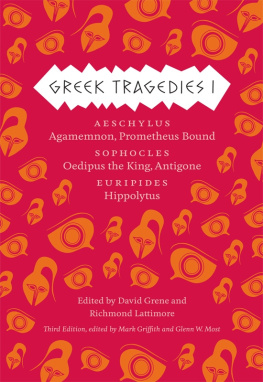
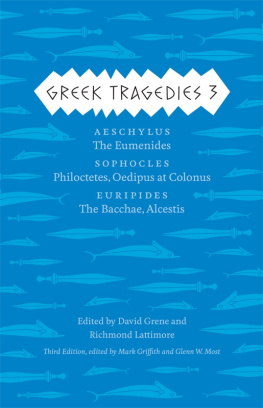
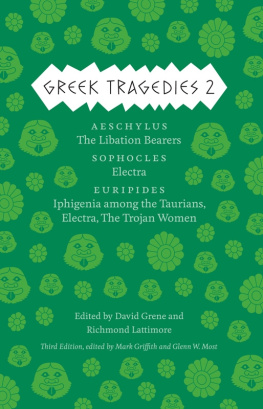

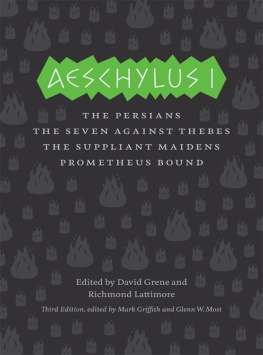
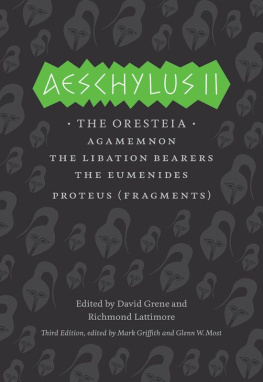
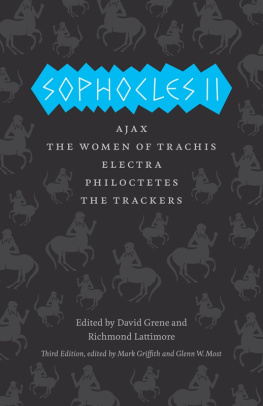
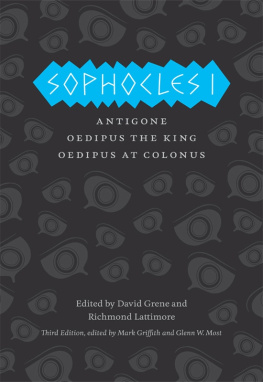
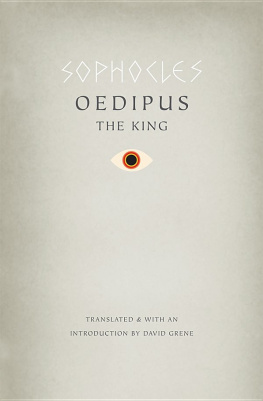
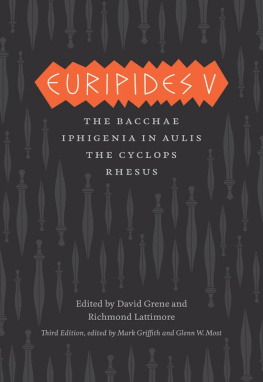
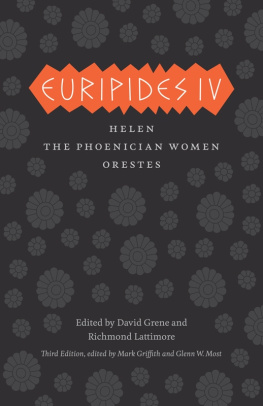
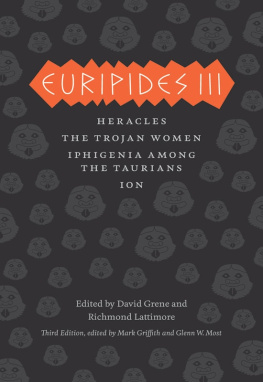
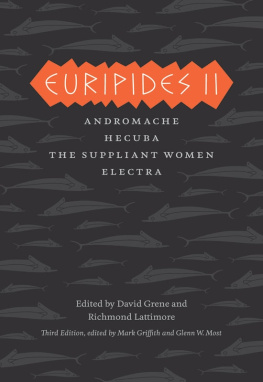
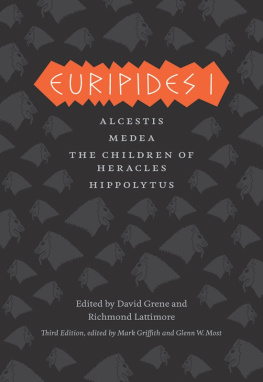
 This paper meets the requirements of ANSI/NISO Z39.481992 (Permanence of Paper).
This paper meets the requirements of ANSI/NISO Z39.481992 (Permanence of Paper).